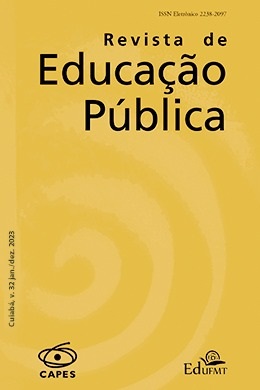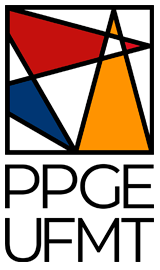QUE FORMAÇÃO DE PROFESSORES DE MODO A ASSEGURAR QUE TODOS OS ALUNOS APRENDEM MATEMÁTICA?
DOI:
https://doi.org/10.29286/rep.v32ijan/dez.15741Palavras-chave:
Formação de Professores, Raciocínio Matemático, Ensino Exploratório, Conhecimento do ProfessorResumo
Este artigo pretende, partindo de uma experiência de formação com professores dos primeiros anos, focada no ensino exploratório e no desenvolvimento do raciocínio matemático, discutir o conhecimento dos professores para promover a aprendizagem dos alunos. Usa uma abordagem qualitativa-interpretativa e os dados recolhidos sujeitos a análise de conteúdo. A interligação entre a teoria e a prática presente nas tarefas de formação parece ter um forte contributo para que as professoras concretizem nas suas práticas letivas a resolução de uma tarefa exploratória, identifiquem os processos de raciocínio envolvidos e ações do professor presentes, alargando assim o seu conhecimento matemático e didático.
Downloads
Referências
ARAMAN, E. M. O.; SERRAZINA, M. L.; PONTE, J. P. “Eu perguntei se o cinco não tem metade”: ações de uma professora dos primeiros anos que apoiam o raciocínio matemático. Educação Matemática Pesquisa, v. 21, n. 2, p. 466-490, 2019.
BALL, D. L. Research on teaching mathematics: Making subject-matterknowledge part of the equation. In J. Brophy (Ed.), Teachers’ knowledge ofsubject matter as it relates to their teaching practice. Greenwich: JAI. p. 1-48, 1991.
BALL, D. L.; HOOVER, M.; PHELPS, G. Content knowledge for teaching: What makes it special? Jornal of Teacher Education, v. 59, n. 5, p. 389-407. 2008. https://doi.org/10.1177/0022487108324554
BARDIN, L. Análise de conteúdo, 4. ed. Lisboa: Edições 70, 2001.
COBB, P.; CONFREY, J.; DISESSA, A.; Lehrer, R.; SCHAUBLE, L. Design experiments in educational research. Educational Researcher, v. 32, n. 1, p. 9–13. 2003. https://doi.org/10.3102/0013189X032001009
CANAVARRO, A. P. Ensino exploratório da Matemática: Práticas e desafios. Educação e Matemática, v. 115, p. 11-17, 2011.
CUSI, A.; MALARA, N. A. Approaching Early Algebra: Teachers’ educational processes and classroom experiences. Quadrante, Lisboa, v. 16, n. 1, p. 57–80, 2007 https://doi.org/10.48489/quadrante.22812
ELLIS, A.; ÖZGUR, Z.; REITEN, L. Teacher moves for supporting student reasoning. Mathematics Education Research Journal, v. 31, n. 2, p. 107-132, 2019 https://doi.org/10.1007/s13394-018-0246-6
EQUIPA DE COORDENAÇÃO DO PROJETO REASON. Princípios para a elaboração de tarefas para promover o raciocínio matemático nos alunos. In PONTE, J. P. (Org.). Raciocínio matemático e formação de professores. Ebook. Lisboa: Instituto de Educação, Universidade de Lisboa. 1.ª edição, p. 99-107, 2023.
FRANCISCO, J. M.; MAHER, C. A. Teachers attending to students’ mathematical reasoning: lessons from an after-school research program. Journal of Mathematics Teacher Education, v. 14, n. 1, p. 49–66. 2011. https://doi: 10.1007/s10857-010-9144-x
HERBERT, S.; BRAGG, L. A. Elementary teachers’ planning for mathematical reasoning through peer learning teams. International Journal for Mathematic Teaching and Learning, v. 22, n. 1, p. 34-43, 2021.
JEANNOTTE, D.; KIERAN, C. A conceptual model of mathematical reasoning for school mathematics. Educational Studies in Mathematics, v. 96, n. 1, p. 1-16, 2017.
LOONG, E. Y-K; VALE, C.; HERBERT, S.; BRAGG, L. A.; WIDJAJA, W. Tracking change in primary teachers’ understanding of mathematical reasoning through demonstration lessons. Mathematics Teacher Education and Development, v. 19, n. 1, p. 5–29, 2017.
KAPUT, J. Teaching and learning a new Algebra with understanding. Dartmouth, MA: National Center for Improving Student Learning and Achievement in Mathematics and Science, 2000.
MATA-PEREIRA, J.; PONTE, J. P. Promover o raciocínio matemático dos alunos: Uma investigação baseada em design. Bolema, v. 32, n. 62, p. 781–801, 2018. https://doi:10.1590/19804415v32n62a02.
MELHUISH, K.; THANHEISER, E.; GUYOT, L. Elementary school teachers’ noticing of essential mathematical reasoning forms: justification and generalization. Journal of Mathematics Teacher Education, v. 23, n. 1, p. 35-67, 2020.
MORAIS, C.; SERRAZINA, L.; PONTE, J. P. Mathematical Reasoning Fostered by (Fostering) Transformations of Rational Number Representations. Acta Scientiae, v. 20, n. 4, p. 552 - 570, 2018.
NCTM (National Council of Teachers of Mathematics) Princípios para a Ação: assegurar a todos o sucesso em Matemática. Lisboa: Associação de Professores de Matemática. 2017.
NCTM (National Council of Teachers of Mathematics). Principles and standards for school mathematics. Reston, Va: NCTM, 2000.
PATTON, M. Qualitative research & evaluation methods (3rd ed.). Saint Paul, MN: Sage. 2002
PONTE, J. P. Gestão curricular. In GTI (Org.). O Professor e o Desenvolvimento Curricular Lisboa:APM, 2005, p.11-34.
PONTE. J. P.; QUARESMA, M; MATA-PEREIRA, J. Como desenvolver o raciocínio matemático na sala de aula?”. Educação e Matemática, n. 156, p. 7-11, 2020.
RODRIGUES, M.; BRUNHEIRA, L.; SERRAZINA, L. A framework for prospective primary teachers’ knowledge of mathematical reasoning processes. International Journal of Educational Research, v. 107, 101750-101761, 2021. https://doi.org/10.1016/ j.ijer.2021.101750
SERRAZINA, M. L. Planificação do ensino-aprendizagem da Matemática. In GTI (Ed.), A prática dos professores: planificação e discussão coletiva na sala de aula Lisboa: APM, p. 9-32, 2017.
SMITH, M. S.; STEIN, M. K. 5 Practices for Orchestrating Productive Mathematics Discussions. Reston, Va: National Council of Teachers of Mathematics, 2011.
STYLIANIDES, A. J.; BALL. D. L. Understanding and describing mathematical knowledge for teaching knowledge about proof for engaging students in the activity of proving. Journal of Mathematics Teacher Education, v. 11, n. 4, p. 307–332, 2008.
STYLIANIDES, A. J; STYLIANIDES, G. J. Content knowledge for mathematics teaching: the case of reasoning and proving. In J. Novotná, H. Moraová, M. Krátká, & N. Stehlíková (Eds.), Proceedings of the 30th PME International Conference, v. 5, PME, p. 201–208, 2006.






















































